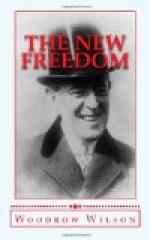For a long time this country of ours has lacked one of the institutions which freemen have always and everywhere held fundamental. For a long time there has been no sufficient opportunity of counsel among the people; no place and method of talk, of exchange of opinion, of parley. Communities have outgrown the folk-moot and the town-meeting. Congress, in accordance with the genius of the land, which asks for action and is impatient of words,—Congress has become an institution which does its work in the privacy of committee rooms and not on the floor of the Chamber; a body that makes laws,—a legislature; not a body that debates,—not a parliament. Party conventions afford little or no opportunity for discussion; platforms are privately manufactured and adopted with a whoop. It is partly because citizens have foregone the taking of counsel together that the unholy alliances of bosses and Big Business have been able to assume to govern for us.
I conceive it to be one of the needs of the hour to restore the processes of common counsel, and to substitute them for the processes of private arrangement which now determine the policies of cities, states, and nation. We must learn, we freemen, to meet, as our fathers did, somehow, somewhere, for consultation. There must be discussion and debate, in which all freely participate.
It must be candid debate, and it must have for its honest purpose the clearing up of questions and the establishing of the truth. Too much political discussion is not to honest purpose, but only for the confounding of an opponent. I am often reminded, when political debate gets warm and we begin to hope that the truth is making inroads on the reason of those who have denied it, of the way a debate in Virginia once seemed likely to end:
When I was a young man studying at Charlottesville, there were two factions in the Democratic party in the State of Virginia which were having a pretty hot contest with each other. In one of the counties one of these factions had practically no following at all. A man named Massey, one of its redoubtable debaters, though a little, slim, insignificant-looking person, sent a messenger up into this county and challenged the opposition to debate with him. They didn’t quite like the idea, but they were too proud to decline, so they put up their best debater, a big, good-natured man whom everybody was familiar with as “Tom,” and it was arranged that Massey should have the first hour and that Tom Whatever-his-name-was should succeed him the next hour. When the occasion came, Massey, with his characteristic shrewdness, began to get underneath the skins of the audience, and he hadn’t made more than half his speech before it was evident that he was getting that hostile crowd with him; whereupon one of Tom’s partisans in the back of the room, seeing how things were going, cried out: “Tom, call him a liar and make it a fight!”




